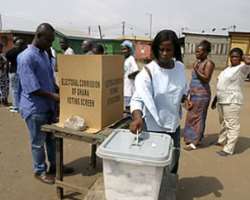Challenges And Opportunities Of Emerging Democracy In Africa

The definition of democracy is complex even though we seem to be comfortable with Abraham Lincoln's definition or description of democracy as the government of the people, by the people and for the people.
That definition goes a long way to justify the election of political leaders where every citizen is expected to have an equal right in the selection of political leaders and the legislature, who then become the voice of the people for a defined period.
We can juggle various definitions of democracy, but true democracy is the process where every individual is involved convinced that his opinion has been factored into the decision-making as far as the management of his society is concerned. A government, irrespective of its mode of appointment, which gives ear to the people and approaches decision making and policy implementation from a human-centered and continued consultative process is closer to democracy than a duly elected government that fails to consult and also treats the opinion of the legislature-the elected representatives of the people as of little value.
Emerging democracies are defined as countries with governments that have emanated out of a perceived legitimate democratic electoral process but are still saddled with complexities of dominant political parties and poorly applied rule of law.
Many scholars on the subject have listed a few countries in our region as emerging democratic. Even more complicated is the fact that many of our countries progress from that nascent stage into well-managed democracies only for them to slip back into democratically embryonic state partly because some of the managers of our political systems are adapt at ensuring that the institutions of state do not perform efficiently leading to their disempowerment and a weakening of the rule of law.
My country people, no true democratic arrangement can be successful if the institutions that are meant to serve as checks and balances are not properly structured and equipped to operate at optimum.
These institutions include independent judiciary, security services, the electoral machinery, a well-oiled and independent media as well as a vibrant and non-partisan civil society.
The major factor required to get these institutions operational is to have a well-framed constitution that is not lacking in definition and that protects adequately the independence of these institutions. It is important also that the same constitution protects these institutions from abuse as they are managed by humans fallible as we are.
Emerging democracies are grappling with problems of incoherent constitutions and weak institutions, allowing some political leaders the leeway to abuse the system through clever and sometimes blatant actions such as appointment of unprincipled and very partisan personalities to head such institutions. The Judiciary and Security services are also not free of excessive control. Abuse of the media either through intimidation or inducement is also part of the challenges such Countries face,
We are also saddled with civil society who instead of exposing ills in government and society and offering concrete options on the way forward rather metamorphose into political entities attacking or over protecting government as if their survival depended on it.
An average African is in dire need of a working democracy that truly protects not only himself but also guarantees a progressive and development-oriented political system that defends freedom, guarantees justice and ensures that society are remains disciplined and focused on what is good and right.
The primary challenge for emerging democracies in Africa is the failure of Western democracy to acknowledge its inherent flaws and dynamics, home grown and imbued with the socio-cultural backgrounds of individual African states.
Our societies are borne out of a strong traditional political framework of Monarchies that wielded both spiritual and societies still look up to the traditional authority for fortitude while our imported democratic and secular leadership is seen unfortunately as synonymous to immorality and corruption. With such perceptions how do we expect our emerging democracies to evolve?
The biggest misconception in embracing democracy is the argument that is comes with economic progress. The Western sponsors of democracy and their allied institutions such as the IMF and the World Bank who offer democratic prescriptions with the promise of financial support for socio-economic development usually present such arguments.
My Country people, allow me to quote Merillee Grindle, a Professor of International Development at the Harvard University, who states that; “Democracy is perceived as not having delivered what was promised. Scholars, NGOs, democratic movements, Politicians and others really have oversold what can be expected from democracy and have raised expectations about what a form of government actually can achieve. Certainly, a democratic regime can deliver, in time, on promises for personal freedom and liberty, for participation in the decision of government and on equality rights. But democracy has also been sold as way to engender economic growth, as a way to achieve economic and social equality democracy is not a panacea for economic development.
Democracy should however be made to provide the political stability for development. A practicing democracy that cannot create the climate to correct economic ills and corruption cannot and will not be a democracy. A democracy that cannot protect the sanctity of its electoral process is engaging in a fraudulent electoral coup d' etat.
Equally destructive is the unfortunate practice of using money to buy the conscience of the electorate.
In conclusion, one of our proudest assets must be our sense of nationalism. Emerging democracies in putting in the place structures such as the National Institute for Legislative Studies must endeavour to inculcate in their citizenry the pride in defending one's Country against corrupt practices that sow seeds of disaffection especially amongst the less-advantaged in society who feel disregarded, abused sand disrespected by a minority elite.
Can we change the cycle of profiting from wrong to profiting from right? If not, once again our democracy will continue to remain vulnerable and fragile.
Taiwo Oluwaleye
Special Assistant on Media to Ekiti Deputy Speaker
Writes from Ado-Ekiti
